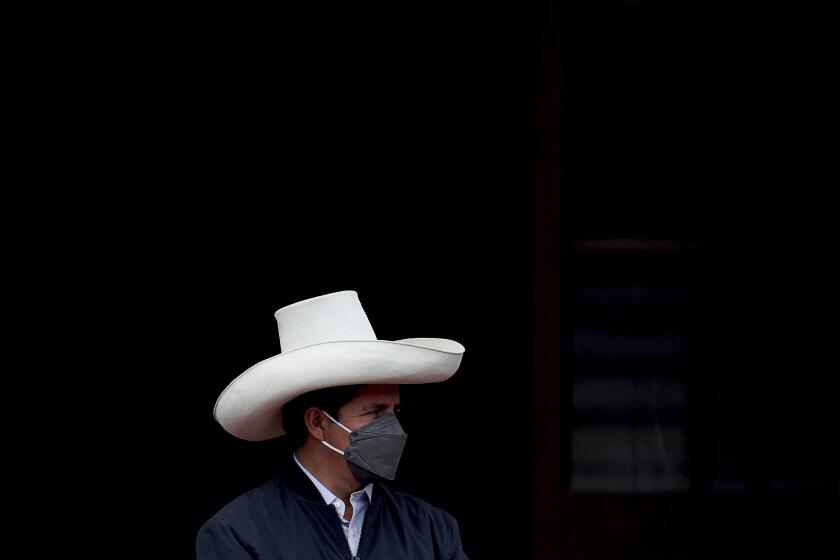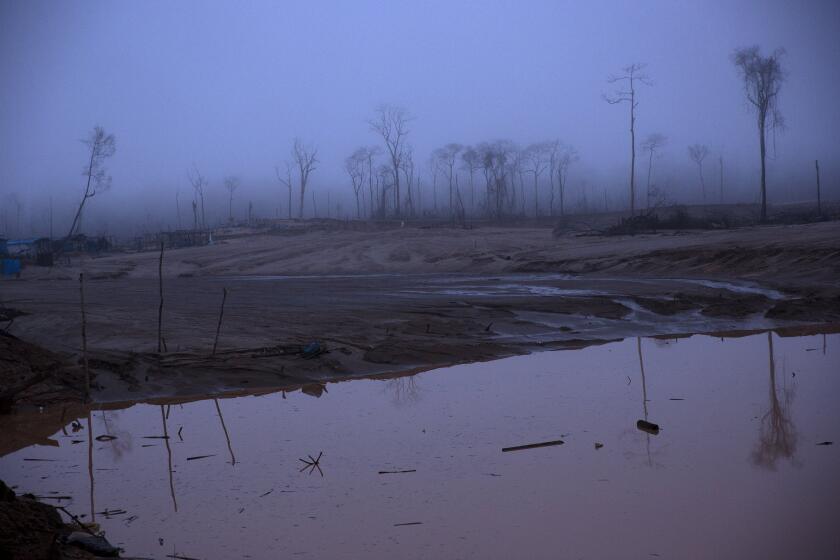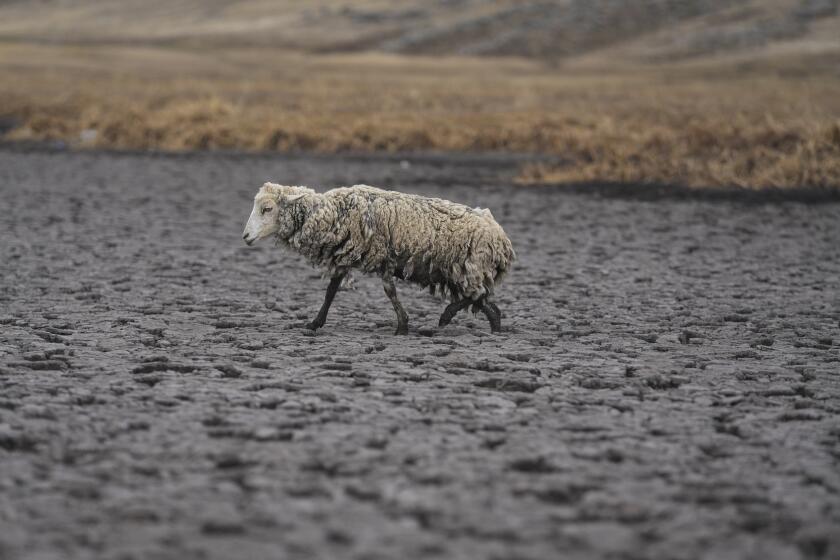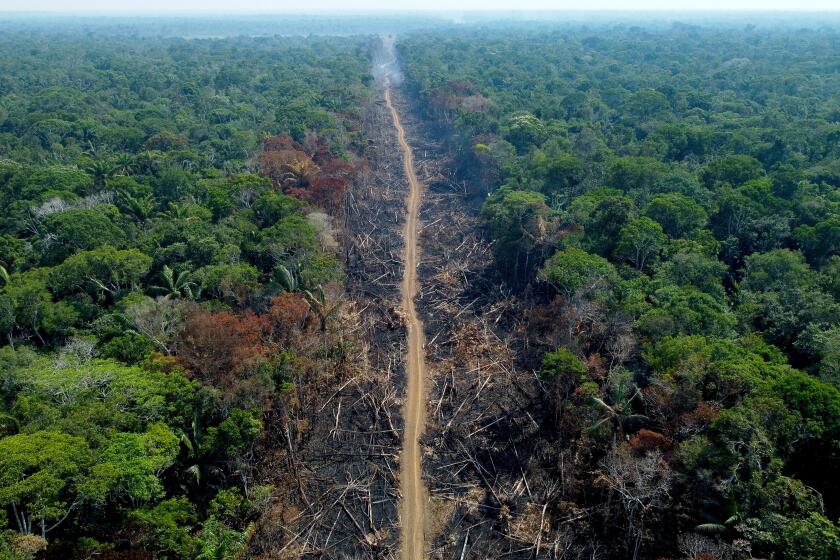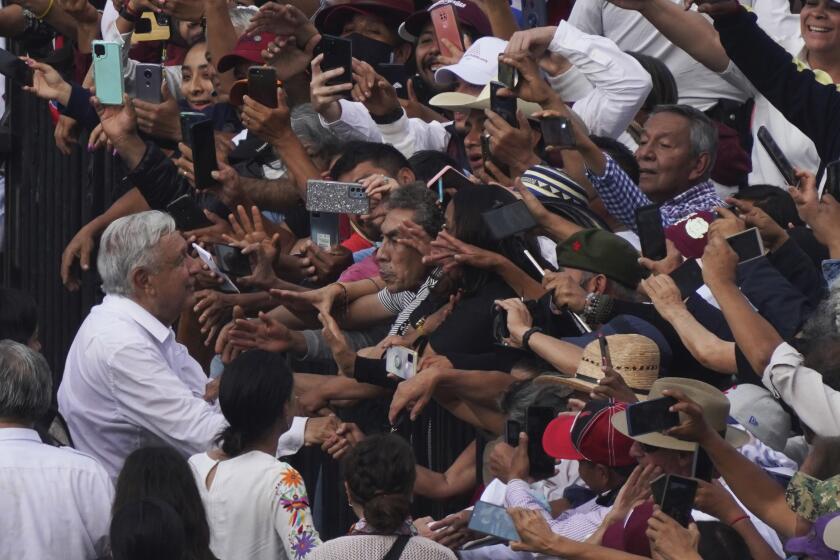Within hours, Peru’s president went from dissolving Congress to being ousted and arrested
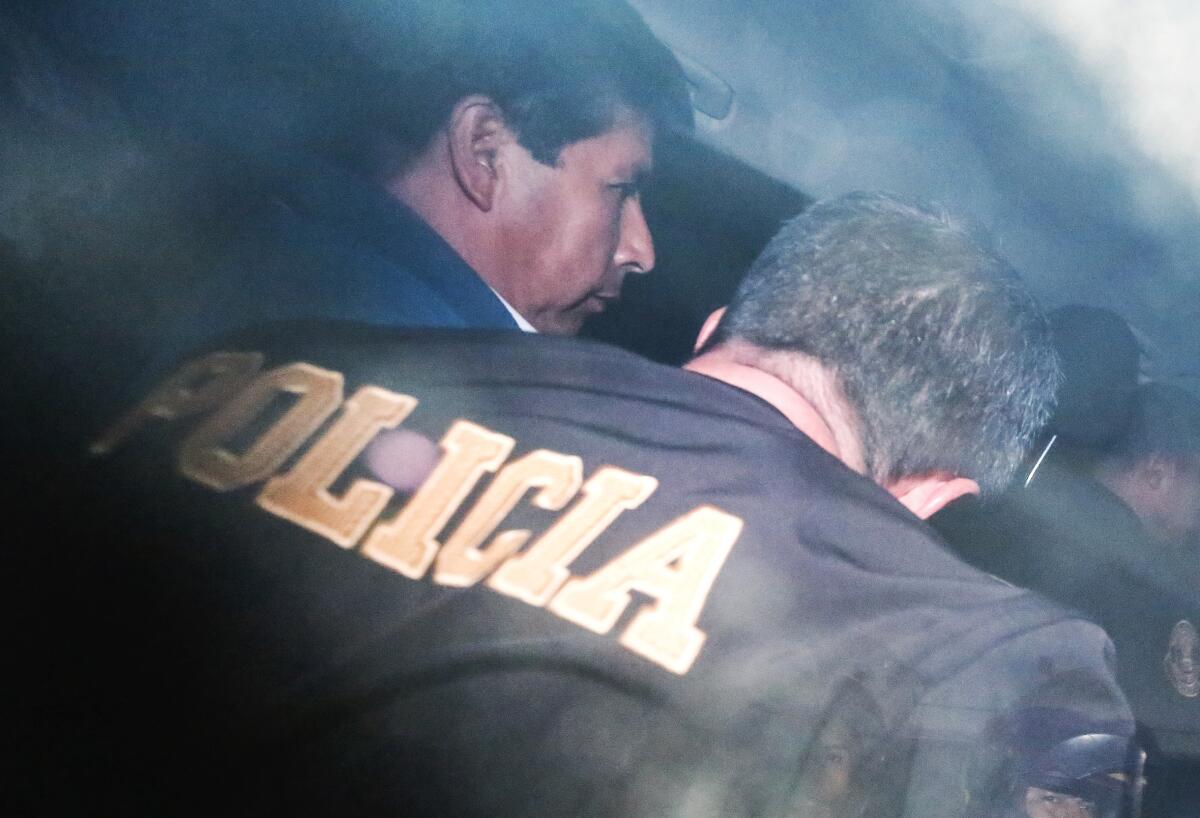
- Share via
LIMA, Peru — In just three tumultuous hours, Peruvian President Pedro Castillo went from decreeing the dissolution of the nation’s Congress to being replaced by his vice president, but the threats to his government had been building throughout his nearly 17-month tenure.
The former schoolteacher and center-left political novice, who won a runoff election in June 2021 by just 44,000 votes, stepped onto a no-holds-barred political battlefield in Peru, which is now on its sixth president in six years. By nightfall Wednesday, after a day of high political drama, prosecutors had announced that Castillo was under arrest, facing charges of rebellion.
From the start, Castillo’s presidency seemed destined to be short-lived, said Flavia Freidenberg, a political scientist at the National Autonomous University of Mexico and a member of the university’s Observatory of Political Reforms in Latin America.
“He is a president who took office with a very low level of support, he didn’t have a political party, he had a hard time putting together a Cabinet, the Cabinet has changed constantly and there has been a constant power struggle with Congress,” she said.
Castillo, a rural school teacher from an impoverished district high in the Andes, was considered a clear underdog when he joined the race to replace President Francisco Sagasti, who had been appointed by Congress in November 2020. Sagasti was the last of three heads of state whom Peru cycled through in one week that November.
Castillo campaigned on promises to nationalize the key mining industry and rewrite the constitution, gaining support in rural Peru. But upon taking office in July 2021, he immediately struggled with his Cabinet choices, a number of whom have been accused of wrongdoing.
A year into his presidency, Pedro Castillo sees his popularity tank for what his critics call a chaotic management style and amid corruption allegations.
“He didn’t unify the country,” said Eric Farnsworth, vice president of the Council of the Americas. “He doesn’t even seem to make much of an effort along those lines.
“He didn’t have much of a mandate, and so he did not promote policies somehow that were easily identifiable as for the good of the majority of the people,” Farnsworth said. “Instead, he became embroiled in intrigues, corruption and battles with Congress.”
The first attempt to impeach Castillo came last December. At the time, a relatively small group of opposition lawmakers cited an investigation by prosecutors into illicit financing of the governing party. To remove the president requires two-thirds of the 130 lawmakers to vote in favor. Only 46 did.
Congress tried to impeach Castillo again in March for “permanent moral incapacity,” a term incorporated into Peruvian constitutional law that experts say lacks an objective definition and that Congress has used more than a half-dozen times since 2017 to try to remove presidents. That effort also failed, with only 55 votes in favor of removal.
As Peru has descended into one of the worst political crises in its history, its protection of its Amazon rainforest is failing, according to a new report.
Each time, Castillo argued that he had done nothing wrong.
“I salute that common sense, responsibility and democracy prevailed,” Castillo tweeted after the second impeachment attempt.
He benefited from the fact that the unicameral Congress was deeply divided. Castillo’s party had the most seats, but with only 37, it alone could not protect him.
On Wednesday, Peru was girding itself for a third impeachment vote. Perhaps Castillo feared that this time there would be enough votes to oust him.
Peru’s small and now dried-up Cconchaccota lagoon is key to survival for people in the area, who rely on the water for their potato crops and livestock.
The night before, the president said in an unusual midnight address on state television ahead of the vote that a certain sector of Congress had it out for him and that he was paying for mistakes made out of inexperience.
Shortly before noon Wednesday, Castillo went on state television and announced the dissolution of Congress. He said that elections would be held to choose new lawmakers and that a new constitution would be written.
Various members of his Cabinet resigned immediately. Vice President Dina Boluarte said via Twitter that the move only aggravated Peru’s political crisis. The Supreme Court, Constitutional Tribunal and national ombudsman rejected it as an attempted coup.
Castillo was driven from the presidential palace through Lima’s historic downtown to a police station. Hours later, prosecutors announced that he had been arrested on suspicion of rebellion.
Start your day right
Sign up for Essential California for the L.A. Times biggest news, features and recommendations in your inbox six days a week.
You may occasionally receive promotional content from the Los Angeles Times.
Two hours after his announcement, lawmakers who had ignored Castillo’s decree voted to remove him. This time they had the votes: 101 in favor, six against and 10 abstentions.
At 3 p.m., Boluarte, a 60-year-old lawyer, was sworn in as Peru’s first female president.
Boluarte said her first order of business would be to address government corruption, ostensibly what led to Castillo’s downfall. She had been expelled in January from the Marxist Free Peru party, which Castillo rode to power, for what she said was not sharing the ideas of its secretary-general.
“There has been an attempted coup ... that has not found an echo in the institutions, nor in the street,” Boluarte said. She called for a political truce to install a national unity government.
Brazil’s incoming president, Luiz Inácio Lula da Silva, has pledged to reverse years of neglect in the Amazon rainforest, halting destruction in Indigenous reserves.
“What I ask for is a space, a time to rescue the country,” she said.
Freidenberg, the political scientist, said Boluarte’s swearing-in was a hopeful sign. “It is a singular opportunity to show Peruvians women’s abilities in a country that is chauvinist, misogynist, discriminatory and where women have had so much trouble trying to access government.”
But Boluarte also takes office with a weak mandate and no party.
“She has to begin to govern in a way that outreaches to political opponents and also seeks to unify a coalition of supporters,” said Farnsworth of the Council of the Americas. “In order to have a working government, you have to have a coalition big enough to advance policies and legislators behind you.”
The institution that helped foster Mexico’s democracy is under attack by President Andrés Manuel López Obrador.
Hanging over the early days of her administration will be the question of what to do with Castillo. Prosecutors vowed to investigate the former president for allegedly rebelling against Peru’s constitutional order.
On Thursday, Castillo made his initial court appearance, looking downcast as he gave simple “yes” or “no” answers and his attorney argued that he had been arbitrarily ousted from Peru’s presidency on trumped-up charges of rebellion.
The U.S. condemned Castillo’s power grab as illegal and even leftist allies have refused to speak out against his overthrow. A major exception was Mexican President Andrés Manuel López Obrador, who called Castillo’s removal a “soft coup” fueled by deep-seated racism against the former schoolteacher from the heavily indigenous Andean highlands.
In the streets, despite the tumult, only small-scale clashes erupted between protesters and riot police, outside a police station where Castillo was taken.
Farnsworth wondered whether Castillo would be put on trial or allowed to seek asylum in another country.
“What do the Peruvian people want? Will they go to the streets and protest and riot, or will they give things a chance to calm down and return to some kind of normalcy?” he said. “I don’t know what’s going to happen in the immediate term, but there are some big questions about this.”
More to Read
Sign up for Essential California
The most important California stories and recommendations in your inbox every morning.
You may occasionally receive promotional content from the Los Angeles Times.
